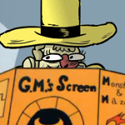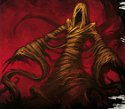- Apocron
- Dec 5, 2005
-
|
This is supposed to be establishing background to the setting. You can either choose one thing from each category or one thing from categories that interest you. I'm neutral as to how much we need them. I originally wanted people to just create whatever they wanted whole cloth and then worry about integrating it after the fact, but the group wanted to establish common lore before creating their own characters.
Honestly speaking it seems like there's still a lot of misunderstanding about what people want. Perhaps my initial pitch was too ambitious because I put the responsibility on players to completely invent the setting they wanted to play in. If players just want a more standard pre-existing setting to play in then maybe I should just go back to the drawing board and choose a different setting/system and then everyone can just build off an existing framework.
What does everyone think? If you don't want to create everything then does anyone have an existing setting or IP they wanted to play a game in?
|
 #
?
May 9, 2024 01:42
#
?
May 9, 2024 01:42
|
|
- Adbot
-
ADBOT LOVES YOU
|

|
|
#
?
May 19, 2024 03:31
|
|
- JessAlias
- Aug 21, 2017
-

|
This is supposed to be establishing background to the setting. You can either choose one thing from each category or one thing from categories that interest you. I'm neutral as to how much we need them. I originally wanted people to just create whatever they wanted whole cloth and then worry about integrating it after the fact, but the group wanted to establish common lore before creating their own characters.
Honestly speaking it seems like there's still a lot of misunderstanding about what people want. Perhaps my initial pitch was too ambitious because I put the responsibility on players to completely invent the setting they wanted to play in. If players just want a more standard pre-existing setting to play in then maybe I should just go back to the drawing board and choose a different setting/system and then everyone can just build off an existing framework.
What does everyone think? If you don't want to create everything then does anyone have an existing setting or IP they wanted to play a game in?
I can say I'm still up for creating things!! If I didn't like creating settings then I wouldn't be running two CYOAs in a custom urban fantasy setting. I'm just asking questions, because I don't want to spend a lot of time drawing up a lot of stuff and then have it get rejected or something. It's just going to take time for me to draw up stuff because I'll probably draft a concept, then post it in here, then wait for feedback... etc.
|
 #
?
May 9, 2024 01:53
#
?
May 9, 2024 01:53
|
|
- Apocron
- Dec 5, 2005
-
|
Ok, well maybe it would be good for everyone to post their desire for the setting (either based on what I presented or original) and then based on those four perspectives we can finalize the basis for the setting and move on from the setting creation stage. The one thing I think we've agreed on is
God War -> Machinists
|
 #
?
May 9, 2024 04:28
#
?
May 9, 2024 04:28
|
|
- Apocron
- Dec 5, 2005
-
|
By the way RonWayne, sorry I haven’t given you feedback on your character. I thought we should iron out this other stuff first since it could influence my suggestions.
|
 #
?
May 9, 2024 14:53
#
?
May 9, 2024 14:53
|
|
- Shellception
- Oct 12, 2016
-

"I'm made up of the memories of my parents and my grandparents, all my ancestors. They're in the way I look, in the colour of my hair. And I'm made up of everyone I've ever met who's changed the way I think"
|
I think I am a bit lost and probably should read up on stats and such, looking at RonWayne's character. Here are some preferences (not set in stone) from your options;
quote:Runes
1. Runic Resurgence: Runes are common and the land is scattered with runic stones, remnants of the Machinists' era, pulsing with latent energy. These runes are sought after for their power to enhance machinery and magic alike.
[not married to the option, probably won't be too relevant]
Legacies
3. The Broken Gods: Fragments of defeated deities linger, their essence embedded in the world's fabric. These fragments occasionally manifest as semi-sentient entities, revered or feared by the populace.
[same, but it's cool as gently caress so why not]
Communities
2. Spirit Harmonists: These communities live in deep symbiosis with the surrounding nature and spirits, blending natural magic with rudimentary technology to sustain their harmonious way of life. Buildings and machines are grown and powered by natural energies, coexisting seamlessly with the local environment.
[first seems a bit too... claustrophobic, pardon the pun, and last seems maybe too religion-based for my liking, so machine hippies it is]
Leaders
1. Runebinders: Leaders who are skilled in the art of rune-binding wield significant power, often acting as both political and spiritual heads of their communities.
[seems related to the above]
Defense
1. Gearforged Militias: Local militias are outfitted with Machinist-derived technology, utilizing gear and devices that blend mechanical engineering with arcane energies. These militias are often the first line of defense against invaders and monstrous incursions, relying on their technologically advanced equipment to maintain safety.
[militias seem the most rational option. On the other hand, MAGICAL MECHA]
Mysticism
1. Runic Diviners: Mystics who specialize in interpreting the flows of magical energy through the landscape, often acting as advisors or seers.
[state buraucrats go. Again not opposed to any of the others]
Religion
1. The New Pantheon: A reformed religious order that worships the diffused divine essences, believing them to be aspects of a new pantheon.
[seems to mesh with Broken Gods]
Beasts
3. Celestial Spawn: Rare and mysterious entities believed to be born from the residual energies of the god war. They appear during celestial events and are both feared and revered for their immense power and mystical origins.
[Godly Beasts!]
Horrors
3. Divine Revenants: Spirits of evil fallen deities or their celestial servants that could not fully dissipate. Bound to the mortal realm, these revenants occasionally break through the veils, driven by fragmented memories and divine malice.
Seems to go well with all of the above.
All in all I don't feel like I have a really strong opinion, and can probably build on alternate ideas if they're more useful to anyone else.
|
 #
?
May 9, 2024 20:21
#
?
May 9, 2024 20:21
|
|
- Apocron
- Dec 5, 2005
-
|
The system is actually relatively simple and intuitive. From the rulebook:
quote:
Stats
• Edge: Quickness, agility, and prowess in ranged combat.
• Heart: Courage, willpower, empathy, sociability, and loyalty.
• Iron: Physical strength, endurance, aggressiveness, and prowess in close
combat.
• Shadow: Sneakiness, deceptiveness, and cunning.
• Wits: Expertise, knowledge, and observation.
So choose one thing you are good at +3, two things you are competent with +2, two things you might struggle with +1.
Role
If you aren’t using assets but want to add a bit more detail to your character, you can use a simplified representation of assets called a role. Here’s how it works:
• Name a role for your character based on their expertise or background. In the Ironlands or a similar setting, you might be a leader, scout, mystic, or healer. If you are hacking Ironsworn for a different setting or genre, use roles which fit the world. If you chose a combat-oriented role, make it narrow enough that it isn’t usable for every potential action in a fight.
• Your role gives you the fictional framing to act using that role in your story. If you are a scout, you are skilled at finding your way in the wilds and observing the enemy from hiding. If you are a mystic, you can perform rituals. If you are a leader, you can command others. You make moves as normal, but the fictional framing might give you permission to make or avoid specific moves, and affect how you envision your actions.
• If you like, give your role greater story potential and specificity with an evocative label. You are not just a priest, you are a Wayward Disciple of the Forgotten One. You are not just a hunter, you are a Sharp-Eyed Hunter of the Hinterlands.
• When you make a move (not a progress move) and envision how your role contributes to this action, choose one before rolling: Add +2, or add +1 and take +1 momentum on a hit.
• For every 6 experience points, you may buy an additional role. Name it, and write it down. Bonuses from multiple roles may not be combined for a single move. If your roles overlap for a particular action, envision which role provides the most influence over your intent and outcome.
With roles there's actually a certain overlap with aspects from Fate so maybe sharing a bit from that system could help with creating them.
quote:Character Aspects
Character aspects are just as permanent, but smaller in scope, attached to an individual PC or NPC. They describe a near-infinite number of things that set the character apart, such as:
Significant personality traits or beliefs (Sucker for a Pretty Face, Never Leave a Man Behind, The Only Good Tsyntavian Is a Dead Tsyntavian).
The character’s background or profession (Educated at the Academy of Blades, Born a Spacer, Cybernetic Street Thief).
An important possession or noticeable feature (My Father’s Bloodstained Sword, Dressed to the Nines, Sharp Eyed Veteran).
Relationships to people and organizations (In League with the Twisting Hand, The King’s Favor, Proud Member of the Company of Lords).
Problems, goals, or issues the character is dealing with (A Price on My Head, The King Must Die, Fear of Heights).
Titles, reputations, or obligations the character may have (Self-Important Merchant Guildmaster, Silver-Tongued Scoundrel, Honor-Bound to Avenge My Brother).
You can invoke or call for a compel on any of your character aspects whenever they’re relevant. GMs, you can always propose compels to any PC. Players, you can suggest compels for other people’s characters, but the GM is always going to get the final say on whether or not it’s a valid suggestion.
In this case Invoke would mean choose between +2 or +1 and +1 momentum. In Fate compel means that the GM suggests perhaps how you might act in a way appropriate for your character but perhaps counter to their current interests and being rewarded with some narrative currency (fate points in that system, perhaps momentum for Ironsworn).
Here's some more advice about making good character aspects which I think is relevant to our roles: https://fate-srd.com/odds-ends/robs-guide-writing-good-aspects
|
 #
?
May 10, 2024 02:13
#
?
May 10, 2024 02:13
|
|
- Ronwayne
- Nov 20, 2007
-

That warm and fuzzy feeling.
|
Regarding character feedback, no worries, I know stuff can get complex in context with everything else. I need to tighten up my Roles there and pick specifically which Moves they're connected with, unless you're running them like Fate aspects and we just roll whenever, not needing to pick a related move beforehand
quote:
1. Runic Resurgence: Runes are common and the land is scattered with runic stones, remnants of the Machinists' era, pulsing with latent energy. These runes are sought after for their power to enhance machinery and magic alike.
2. Runebinders' Guild: An organization has risen, dedicated to studying and controlling the use of runes, balancing the fine line between innovation and catastrophe.
3. Lost Runic Archives: Deep in the wilds lie hidden archives of runic knowledge, said to contain blueprints of forgotten technologies and spells. These are coveted by those brave enough to delve into the unknown.
Legacies
1. Echoes of War: The landscape is scarred by the ancient divine war, with battlefields still emanating mystical energies that can alter reality. These sites attract historians, treasure hunters, and those seeking to tap into the raw power left behind.
2. The Machinists' Heirs: Descendants of the Machinists who survived their civilization's downfall continue to explore and preserve the remnants of their heritage, often clashing with others over the control and use of ancient technologies.
3. The Broken Gods: Fragments of defeated deities linger, their essence embedded in the world's fabric. These fragments occasionally manifest as semi-sentient entities, revered or feared by the populace.
Communities
1. Vault Dwellers: In the wake of ancient calamities, these communities took refuge in massive underground vaults. Over generations, they have developed self-contained societies, reliant on ancient technology and strict social codes to survive beneath the earth.
2. Spirit Harmonists: These communities live in deep symbiosis with the surrounding nature and spirits, blending natural magic with rudimentary technology to sustain their harmonious way of life. Buildings and machines are grown and powered by natural energies, coexisting seamlessly with the local environment.
3. Rune Temples: Dominated by Techno-Priests, these settlements are built around significant Machinist ruins. The Techno-Priests guide their people in spiritual and practical matters, harnessing the power of runes to protect and benefit their communities through rituals that blend mysticism with technology.
Leaders
1. Runebinders: Leaders who are skilled in the art of rune-binding wield significant power, often acting as both political and spiritual heads of their communities.
2. Techno-Priests: Some communities are led by Techno-Priests, who interpret the will of the divine through the machinations of ancient technology.
3. Warlords of the Wastes: In less civilized areas, powerful warlords claim dominion, using scavenged technology and brute force to maintain control.
Defense
1. Gearforged Militias: Local militias are outfitted with Machinist-derived technology, utilizing gear and devices that blend mechanical engineering with arcane energies. These militias are often the first line of defense against invaders and monstrous incursions, relying on their technologically advanced equipment to maintain safety.
2. Runic Guardians: These elite defenders are equipped with gear infused with ancient runes, granting them enhanced abilities and powers. They protect key locations and are revered for their mastery over rune-enhanced weaponry and armor. (kind of like mecha?)
3. Spirit Wardens: In these communities, spirits are invoked for protection and combat. Trained individuals, known as Wardens, form pacts with protective spirits, utilizing their powers to guard their settlements against both natural and supernatural threats. (Kind of like Type Moon/Fate servants?)
Mysticism
1. Runic Diviners: Mystics who specialize in interpreting the flows of magical energy through the landscape, often acting as advisors or seers.
2. Spirit Binders: Those rare individuals who can communicate with and bind the spirits of the land, using their powers to heal or hex.
3. Cults of the Arcane: Secret societies that delve into the forbidden aspects of rune magic and divine energies, seeking to unlock powers that many believe should remain hidden.
Religion
1. The New Pantheon: A reformed religious order that worships the diffused divine essences, believing them to be aspects of a new pantheon.
2. Cult of the Machine: Followers who venerate the Machinists' ancient technologies as divine constructs, performing rituals to awaken or appease them.
3. Ancestral Spirit Worship: Many communities honor the spirits of their ancestors, believed to be infused with divine energy from the ancient wars, seeking their guidance and protection.
Beasts
1. Mechanical Constructs: Beast-like constructs from the Machinists' era roam the wilds, some still following their ancient programming to guard, patrol, or hunt. These mechanical beasts often protect valuable ruins or serve as guardians for forgotten technologies.
2. Infused Predators: Natural creatures that have absorbed runic energies and divine essences, evolving into more formidable forms. These creatures are highly prized for their magical properties, but are dangerous and unpredictable.
3. Celestial Spawn: Rare and mysterious entities believed to be born from the residual energies of the god war. They appear during celestial events and are both feared and revered for their immense power and mystical origins.
Horrors
1. Echoes of the God War: Phantasmal echoes of the divine conflict that occasionally manifest in the world, causing chaos and destruction. These echoes are unpredictable, appearing as spectral armies or malevolent spirits that haunt the landscapes where the battles were fiercest.
2. Runic Anomalies: Areas where the rune-infused landscapes have become corrupted or unstable, spawning twisted horrors that defy natural laws. These anomalies are dangerous hotspots that adventurers either seek to contain or harness.
3. Divine Revenants: Spirits of evil fallen deities or their celestial servants that could not fully dissipate. Bound to the mortal realm, these revenants occasionally break through the veils, driven by fragmented memories and divine malice.
I realize this is a bit like pointing at a buffet and go "one of everything please", but I like all of these.
|
 #
?
May 10, 2024 16:39
#
?
May 10, 2024 16:39
|
|
- Ronwayne
- Nov 20, 2007
-

That warm and fuzzy feeling.
|
Everything okay?
|
 #
?
May 13, 2024 04:00
#
?
May 13, 2024 04:00
|
|
- Apocron
- Dec 5, 2005
-
|
Half not really being able to update on the weekend and the other half is waiting for Spacebanito...
|
 #
?
May 13, 2024 06:37
#
?
May 13, 2024 06:37
|
|
- Adbot
-
ADBOT LOVES YOU
|

|
|
#
?
May 19, 2024 03:31
|
|
- Spacebanito
- Dec 4, 2009
-

Die thou unsung.
|
Half not really being able to update on the weekend and the other half is waiting for Spacebanito...
Sorry, I think it's probably best I actually bail, I'm realizing I don't have the ability to focus on something narrative driven right now. Apologies to all involved
|
 #
?
May 19, 2024 03:14
#
?
May 19, 2024 03:14
|
|









